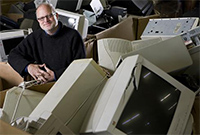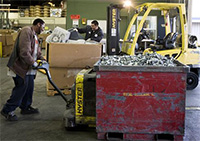Watchdogs Hound E-Waste Exports
by Julie Schmit, USA TODAY
 |
 |
 |
 |
| |
 |
|
 |
 |
 |
| |
 |
|
| |
Jim Puckett is director of Basel Action Network, an environmental group at the forefront of an effort to monitor U.S. electronics recycling. |
|
 |
 |
 |
| |
 |
|
| |
Tyrone Wiggins, left, 22, of Kent, Wash., takes a bin of scrap metal while Brian Morones, 18, of Seattle brings in a box of electronics to be recycled at Total Reclaim in Seattle on Dec. 4.
Images by Stephen Brashear
for USA TODAY |
|
 |
 |
 |
|
| |
29 December 2008 (Seattle) – Hong Kong intercepted and returned 41 ship containers to U.S. ports this year because they carried tons of illegal electronics waste from the U.S., according to the Hong Kong Environmental Protection Department.
By turning the containers away, Hong Kong thwarted attempts by U.S. companies to dump 1.4 million pounds of broken TVs or computer monitors overseas and an estimated 82,000 pounds of lead, a known toxin, in the devices.
But thousands of other shipments probably slipped through, says Jim Puckett, head of the Basel Action Network, or BAN, a three-employee environmental non-profit that over eight years has become a respected watchdog over the rapidly growing electronics recycling industry.
Puckett expects much more e-waste will be exported from the U.S. once the broadcasting industry switches to digital signals on Feb. 17 and millions of households junk their old analog TV sets.
That's one reason BAN and other activists have ramped up efforts to slow the unfettered export of the USA's e-waste to poorer countries. There are signs they're getting results. Since August, when the Government Accountability Office released a blistering investigative report declaring that exported U.S. e-waste was often disposed of unsafely in countries such as China and India, BAN has received pledges from dozens of electronics recyclers that they won't export. It also has won more support for its ambitious plan to set standards for recyclers so that customers can identify the environmentally responsible ones. Meanwhile, more companies of all kinds — fearful of being exposed as global polluters — are auditing recyclers to make sure they don't export refuse from electronics to poorer countries.
"We are at a tipping point," says Robert Houghton, president of e-waste recycler Redemtech of Ohio, one of the industry's leaders. "More companies recognize that people care about this, and there's a bit more regulatory attention being paid to people defrauding the system."
Puckett, 54, a former Greenpeace worker, was among the first to show U.S. consumers the impact of toxic e-waste on China. In 2001, he traveled to Guiyu, China, with a handheld camera and a Chinese translator. There, he documented tens of thousands of peasants soaking spent electronics in acid baths or burning them in open-air fires to recover the gold, silver and copper within. The rudimentary techniques left behind toxic sludge, air and water. BAN and the Silicon Valley Toxics Coalition turned his investigation into a film, Exporting Harm, which was distributed throughout the electronics industry and helped publicize the issue.
This past May, Puckett returned to the same village with a news crew from 60 Minutes and found that the situation had worsened. 60 Minutes dubbed Guiyu "one the most toxic places on Earth," where tests have shown seven of 10 children have high levels of lead in their bodies.
Still, the landscape has shifted measurably. In 2001, Puckett and the one other BAN employee could find no U.S. recyclers who weren't exporting e-waste to developing countries. No U.S. law prevented the export of e-waste to developing countries.
Since then, BAN — working on a shoestring budget from an office in Seattle with mismatched furniture and concrete floors — has had 40 recyclers take its E-Steward pledge not to export to poorer countries. In the wake of August's report from the GAO, Congress' investigative arm, 82 other recyclers have joined BAN's waiting list to earn its E-Steward designation.
What's more, more businesses and institutions are requesting that their recyclers be E-Stewards. Earlier this year, Wells Fargo started seeking recyclers that have taken the E-Stewards pledge or plan to. Last year, the University of California started requiring that its recyclers be E-Stewards. Also in 2007, Sony became the first electronics maker to take BAN's pledge requiring that its recyclers not export to developing countries.
Samsung Electronics America says it modeled its recycling program on BAN's standards. "They are the most stringent, and we wanted to set a high bar," says Steven Cook, Samsung senior vice president.
Equally important, more companies are auditing recyclers. "Four years ago, the corporations called and said, 'I've got stuff. Can you come and get it?' " says Mike Wright, CEO of Guaranteed Recycling Experts in Denver. "Now they say, 'I've got stuff. What are you going to do with it, and our auditors will check that out.' "
Tougher audit process
BAN (www.ban.org), too, is strengthening its audit procedures. In 2010, it'll launch a voluntary certification program for the USA's 300 to 500 e-waste recyclers. The EPA estimates the industry recycles 60 million electronics products a year, most of which are exported.
Now, E-Stewards must pass a "desk audit" by BAN. The audit includes a check of a recycler's paperwork and phone interviews with their subcontractors to track e-waste from collection to disposal. To be BAN-certified, recyclers will have to pay for more rigorous audits by trained inspectors. Those will include onsite visits of recyclers and subcontractors. BAN's current E-Stewards have pledged $400,000 — double BAN's annual budget — to help BAN develop its standard, hire consultants and train auditors to track e-waste through what can be a maze of recyclers, brokers and wholesalers.
"We know all the tricks that people use to hide exports," says Houghton of Redemtech, one of the E-Stewards. He says companies that hire recyclers and "want to do the right thing" lack auditing expertise to track e-waste. He estimates that 80% of U.S. e-waste collected for recycling is exported and that most recyclers "defraud their clients when it comes to exporting."
The recycling industry's trade association, the Institute of Scrap Recycling Industries, disagrees.
"I have to believe the majority are doing the right thing," says Robin Wiener, ISRI president. She says illegal exports should be stopped but that a ban on e-waste exports to developing countries would punish companies in those countries that have high-tech recycling capabilities.
Instead of a ban, ISRI supports another new certification effort, dubbed R-2, which is also supported by the EPA. To be R-2 certified, recyclers can export to some developing countries, but they have to verify that those exports are recycled responsibly, says the EPA's Tisha Petteway.
Puckett says R-2 is full of loopholes, including one allowing unrestricted export of old circuit boards as long as they're shredded — which doesn't remove some toxic material.
ISRI also says that the U.S. should help China and others upgrade their recycling facilities. Focusing on exports is a "red herring," says Eric Harris, ISRI's director of international affairs.
While BAN and others have long charged that U.S. e-waste was polluting poorer countries, the GAO's August report lent weight to their claims.
The GAO, after a 10-month investigation, lambasted the EPA for failing to enforce the USA's only regulation regarding e-waste exports. That rule says that broken cathode-ray tubes (CRTs) — the lead-containing picture tubes in older TVs and computer monitors — cannot be exported unless the U.S. recycler notifies the EPA and gets permission from the importing country.
Posing as buyers of broken CRTs in Asia, the GAO investigators e-mailed 343 U.S. recyclers looking for old CRTs. Of the 64 companies that responded, 43 agreed to export the CRTs in apparent violation of the CRT rule, the GAO said.
When contacted by the GAO, many of the companies claimed not to export CRTs even though their employees offered just that to undercover GAO investigators. Many of the recyclers also touted their environmental images on websites. None had notified the EPA of their intent to export, and some told investigators that the CRT rule was never enforced, the GAO report said.
Given that the CRT rule was enacted in 2007, the EPA says it was more focused on educating recyclers than on enforcement. But it also said that it's undertaken 20 investigations of recyclers and fined one recycler $10,000. The agency refused to give further details.
Increased vigilance
Because of the GAO's investigation, "EPA enforcement went from non-existent, to them actually doing something," says John Stephenson, the GAO's lead investigator on the e-waste report.
He says the GAO consulted BAN, and other groups, when doing its investigation. BAN, in particular, showed investigators from both the GAO and the EPA how to track illegal exports.
BAN's tactic? It stations volunteers near recyclers' loading docks and photographs container numbers as the containers get filled. Then, BAN tracks the containers' movement via public websites and alerts officials in the receiving country that a suspect container is on the way.
Some of the containers turned back in Hong Kong resulted from tips from BAN, its records indicate. Hong Kong refused to name the companies involved.
Puckett says recyclers are so aware of BAN that they've tried to hide container numbers from photographers. He says BAN, traditionally funded by environmentally focused foundations and individuals, will continue that work, as well as its certification business.
"The industry is scared," he says. "That's a good thing."
FAIR USE NOTICE. This document contains copyrighted material whose use has not been specifically authorized by the copyright owner. The Basel Action Network is making this article available in our efforts to advance understanding of ecological sustainability and environmental justice issues. We believe that this constitutes a 'fair use' of the copyrighted material as provided for in section 107 of the US Copyright Law. If you wish to use this copyrighted material for purposes of your own that go beyond 'fair use', you must obtain permission from the copyright owner.
More News
|